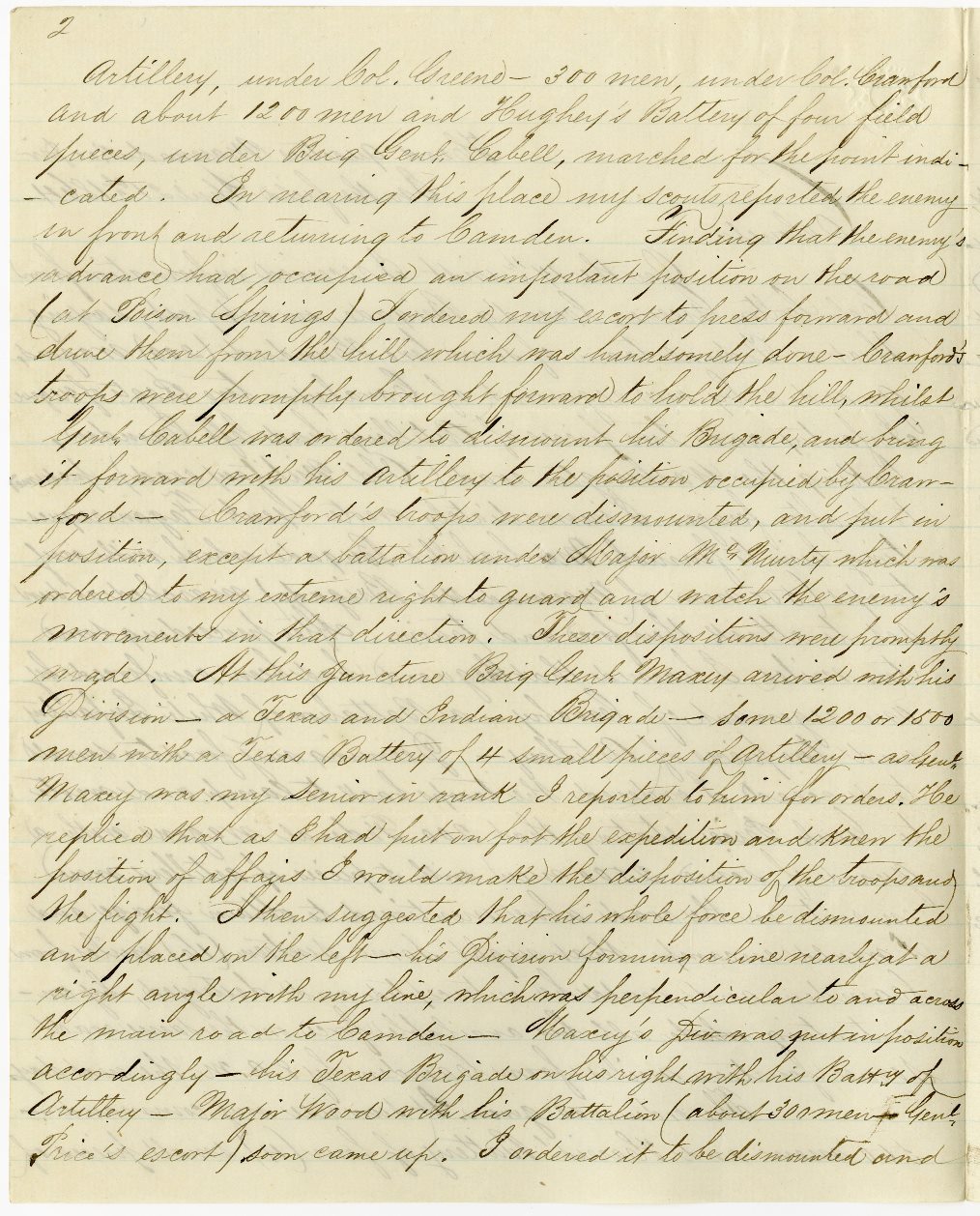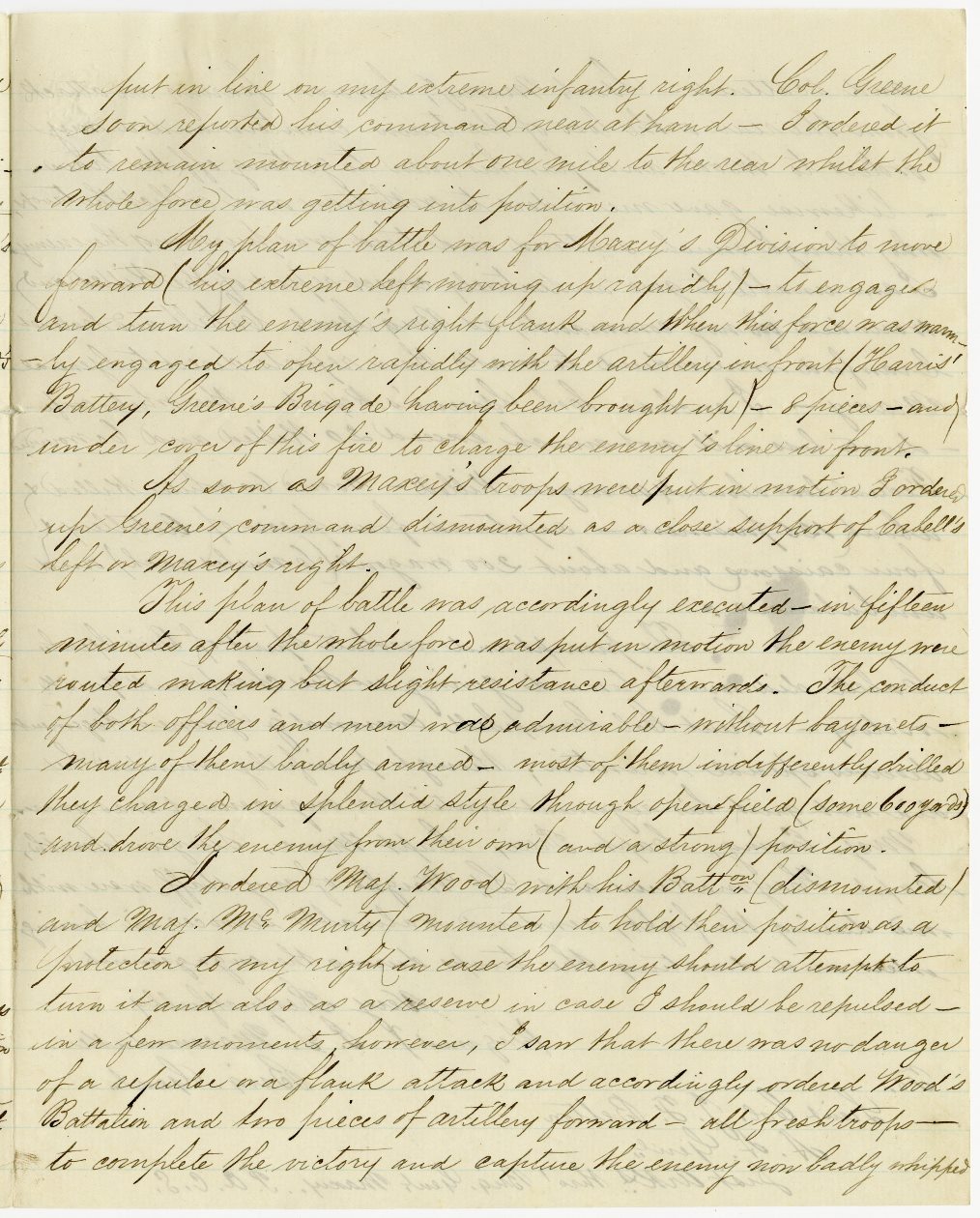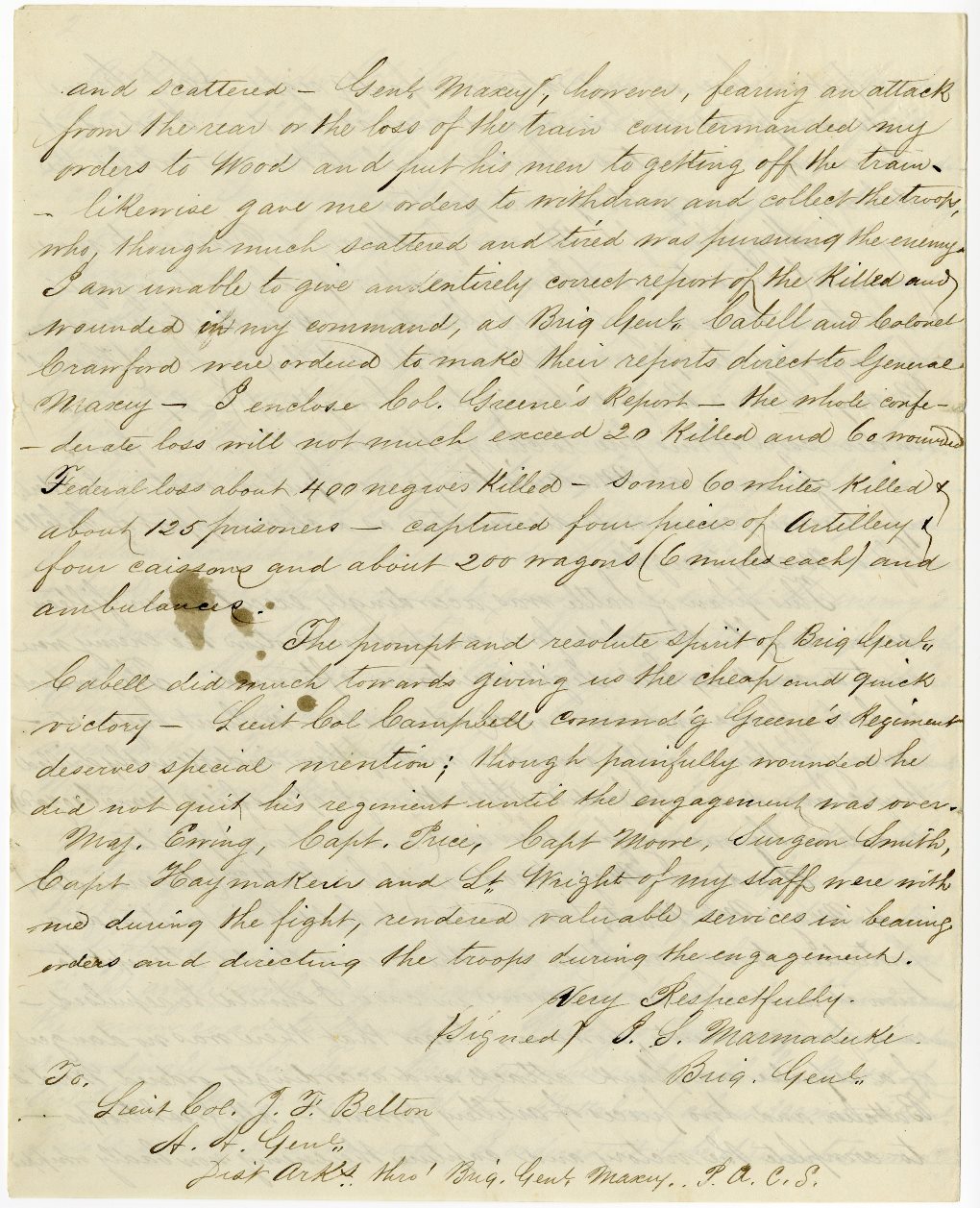Item description: Letter, dated 21 April 1864, from Brigadier General John S. Marmaduke to Lieutenant Colonel J. F. Belton, Assistant Adjutant General under Brigadier General S. B. Maxey. The letter gives and account of recent military engagements, including the Battle of Poison Springs, Arkansas.
[transcription available below images]
Item citation: From folder 39 in the Edmund Kirby-Smith Papers, #404, Southern Historical Collection, The Wilson Library, University of North Carolina at Chapel Hill.
Item transcription:
Head quarters Marmaduke’s Div
In the field April 21st 1864
Colonel.
On the 17th inst. I received information from Col. Colton Greene, Comd’g Brigade, saying that a Federal train of some two Hundred (200) wagons, guarded by one regiment of Cavalry, two Regts of negroe Infantry and two pieces of Artillery had left Camden, taking the Washington road (Old Military road), presumed to be after forage. I immediately wrote Genl. Fagan reques-ting him to furnish me Cabell’s Brigade which with my troops (500 men of Marmaduke’s Brigade) marched at sun set to attack their force and train. After proceeding some two miles I learned that the guard had been reinforced by one regiment of Cavalry, a Battalion of White Infantry and two pieces of Artillery. Deeming my force too small to proceed I ordered my troops back to camp and wrote to Genl Price stating that two hundred Federal wagons with a guard of some 2500 men with 5 pieces of artillery were en route on the road above mentioned to obtain forage and I would encamp that night some sixteen (16) miles from Camden and could be intercepted and destroyed, by con-centrating all his available force on the same road some fourteen miles from Camden by 8 a.m. the next day.
The order was given. At sunrise my command, 500 men and Harris’ Battery of four (4) small pieces of Artillery, under Col. Greene 300 men, under Col. Crawford; and about 1200 men and Hughey’s Battery of four field pieces, under Brig. Gen. Cabell, marched for the point indi-cated. In nearing this place my scouts reported the enemy in front and returning to Camden. Findin that the enemy’s [indrance?] had occupied an important position on the road (at Poison Springs) I ordered my escort to press forward and drive them from the hill which was handsomely done – Crawford’s troops were promptly brought forward to hold the hill, whilst Gen. Cabell was ordered to dismount his Brigade, and bring it forward with his artillery to the position occupied by Cran-ford. Cranford’s troops were dismounted, and put in position, except a battalion under Major McMurty which was ordered to my extreme right to guard and watch the enemy’s movements in that direction. These dispositions were promptly made. At this juncture Brig. Gen. Maxey arrived with his Division, a Texas and Indian Brigade, some 1200 or 1500 men with a Texas Battery of 4 small pieces of artillery, as Genl. Maxey was my senior in rank I reported to him for orders. He replied that as I had put on foot the expedition and knew the position of affairs I would make the disposition of the troops and the flight. I then suggested that his whole force be dismounted and placed on the left, his division forming a line nearby at a right angle with my line, which was perpendicular to and across the main road to Camden. Maxey’s Div was put in position accordingly, his Texas Brigade on his right with his Batty. of Artillery. Major Wood with his Battalion (about 300 men, Genl Price’s escort) soon came up. I ordered it to be dismounted and put in line on my extreme infantry right. Col. Greene soon reported his command near at hand. I ordered it to remain mounted about one mile to the rear whilst the whole force was getting into position.
My plan of battle was for Maxey’s Division to move forward (his extreme left moving up rapidly) to engage and turn the enemy’s right flank and when this force was warm-ly engaged to open rapidly with the artillery in front (Harris’ Battery, Greene’s Brigade having been brought up), 8 pieces, and under cover of this fire to charge the enemy’s line in front.
As soon as Maxey’s troops were put in motion I ordered up Greene’s command dismounted as a close support for Cabell’s left or Maxey’s right.
This plan of battle was accordingly executed – in fifteen minutes after the whole force was put in motion the enemy were routed making but slight resistance afterwards. The conduct of both officers and men was admirable, without bayonets, many of them badly armed, most of them indifferently drilled they charged in splendid style through open field (some 600 yards) and drove the enemy from their own (and a strong) position.
I ordered Major Wood with his Batton. (dismounted) and Major McMurty (mounted) to hold their positions as a protection to my right in case the enemy should attempt to turn it and also as a reserve in case I should be repulsed. In a few moments, however, I saw that there was no danger of a repulse or flank attack and accordingly ordered Wood’s Battalion and two pieces of artillery forward, all fresh troops, to complete the victory and capture the enemy now badly whipped and scattered. General Maxey, however, fearing an attack from the rear or the loss of the train, countermanded my orders to Wood and put his men to getting off the train, likewise gave me orders to withdraw and collect the troops who, though much scattered and tired was pursuing the enemy. I am unable to give an entirely correct report of the killed and wounded in my command, as Brig Gen. Cabell and Colonel Crawford were ordered to make their reports direct the General Maxey. I enclose Col.Greene’s report – the whole confe-derate loss will not much exceed 20 killed and 60 wounded, Federal loss about 400 negroes killed, some 60 white killed & about 125 prisoners, captured four pieces of Artillery & four caissons and about 200 wagons (6 mules each) and ambulances.
The prompt and resolute spirit of Brig. Genl. Cabell did much toward giving up the cheap and quick victory. Lieut. Col. Campbell commd’g Greene’s regiment deserves special mention; though painfully wounded he did not quit his regiment until the engagement was over.
Maj. Ewing, Capt. Price, Capt. Moore, Surgeon Smith, Capt. [Haymaker?] and Lieut. Wright of my staff were with me during the fight, rendered valuable services in bearing orders and directing the troops during the engagement.
Very respectfully,
(Signed) J. S. Marmaduke
Brig Genl.
To.
Lieut. Col. J. F. Belton
A. A. Genl.
Dist. Arks. [thro’?] Brig. Genl. Maxey. P.A.C.S.





